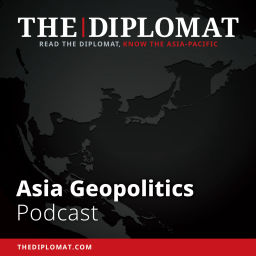
by The German Marshall Fund
China’s rise has captivated and vexed the international community. From defense, technology, and the environment, to trade, academia, and human rights, much of what Beijing does now reverberates across the map. China Global is a new podcast from the German Marshall Fund that decodes Beijing’s global ambitions as they unfold. Every other week, host Bonnie Glaser will be joined by a different international expert for an illuminating discussion on a different aspect of China’s foreign policy, the worldview that drives its actions, the tactics it’s using to achieve its goals—and what that means for the rest of the world.
Language
🇺🇲
Publishing Since
5/24/2021
Email Addresses
1 available
Phone Numbers
0 available

April 29, 2025
This episode of the China Global podcast discusses evolving disputes between China and South Korea, specifically regarding their unresolved maritime boundary in the Yellow Sea. There is a long history of fishing disputes between the two countries in the Provisional Measures Zone (or PMZ) of the Yellow Sea, which is where their exclusive economic zones overlap. Although China and South Korea have engaged in negotiations over the years, they have yet to come to an agreement on their boundaries in the Yellow Sea. Taking advantage of the persisting disagreement on delimitation of maritime borders, China has employed gray zone tactics in the Yellow Sea to expand its territorial presence in the region. In the most recent dispute, China installed a new steel structure in the PMZ, causing a maritime standoff between Chinese and Korean coast guards. To discuss recent developments in the Yellow Sea and China’s broader gray zone tactics in the maritime realm, host Bonnie Glaser is joined by Ray Powell, the Director of SeaLight, a maritime transparency project at Stanford University’s Gordian Knot Center for National Security Innovation. Ray is also the co-host of the Why Should We Care About the Indo-Pacific podcast, and a 35-year veteran of the US Air Force.

April 15, 2025
As China’s military capabilities expand, US-China frictions intensify, and regional tensions increase, concern is on the rise that a potential crisis, either accidental or deliberate, could take place that could spiral out of control. If a crisis arises with China, leaders may want to de-escalate and prevent a wider conflict. To do so, they will need to understand how China thinks about crisis management and escalation. The guest for this episode has dug into the writings of PLA strategists and authoritative PRC sources as well as Western scholarship to assess how China views military escalation and how the US and other countries can accurately predict and interpret PRC signal in crisis scenarios. Lyle Morris is a Senior Fellow on Foreign Policy and National Security at the Center for China Analysis at the Asia Society Policy Institute. His recently published paper is titled “China’s Views on Escalation and Crisis Management and Implications for the United States.”

April 1, 2025
The year 2025 marks the 10th anniversary of China’s Digital Silk Road, which has become an increasingly crucial component of Xi Jinping’s flagship foreign policy project: the Belt and Road Initiative. Over the past decade, China has massively expanded its digital infrastructure investment across the globe. Accompanying the investment has been the diffusion of China’s digital governance norms and standards in recipient states. Countries in the Indo-Pacific have been at the forefront of this stretching Chinese digital influence landscape. The conflation between digital development cooperation and digital governance norms adoption has far-reaching implications that need to be better understood and addressed. To discuss the issue, Michael Caster joins host Bonnie Glaser. Caster is the Head of Global China Programme at ARTICLE 19, an NGO that advances freedom of opinion and expression. His organization has published two reports examining China's Digital Silk Road.

CSIS | Center for Strategic and International Studies

Center for Strategic and International Studies

Center for Strategic and International Studies

The Diplomat

Kaiser Kuo

Hudson Institute

The Spectator

CSIS | Center for Strategic and International Studies

Foreign Affairs Magazine

CSIS | Center for Strategic and International Studies

Council on Foreign Relations

Foreign Policy

The China-Global South Project

Council on Foreign Relations
Pod Engine is not affiliated with, endorsed by, or officially connected with any of the podcasts displayed on this platform. We operate independently as a podcast discovery and analytics service.
All podcast artwork, thumbnails, and content displayed on this page are the property of their respective owners and are protected by applicable copyright laws. This includes, but is not limited to, podcast cover art, episode artwork, show descriptions, episode titles, transcripts, audio snippets, and any other content originating from the podcast creators or their licensors.
We display this content under fair use principles and/or implied license for the purpose of podcast discovery, information, and commentary. We make no claim of ownership over any podcast content, artwork, or related materials shown on this platform. All trademarks, service marks, and trade names are the property of their respective owners.
While we strive to ensure all content usage is properly authorized, if you are a rights holder and believe your content is being used inappropriately or without proper authorization, please contact us immediately at [email protected] for prompt review and appropriate action, which may include content removal or proper attribution.
By accessing and using this platform, you acknowledge and agree to respect all applicable copyright laws and intellectual property rights of content owners. Any unauthorized reproduction, distribution, or commercial use of the content displayed on this platform is strictly prohibited.
